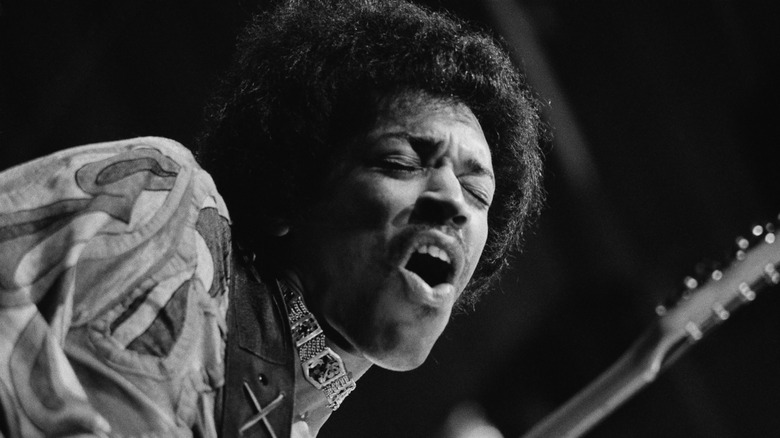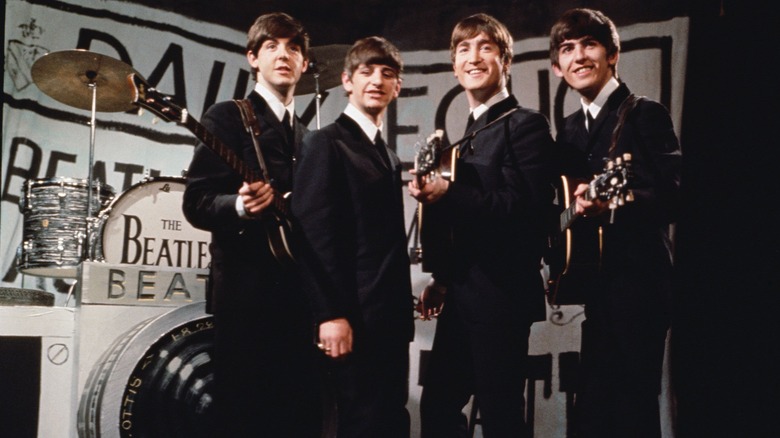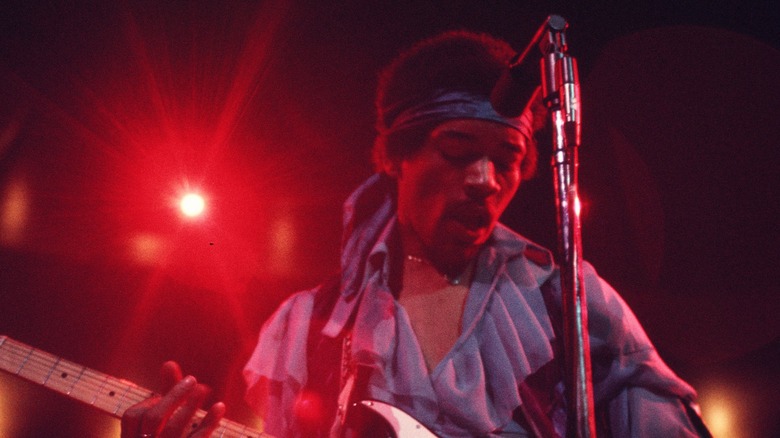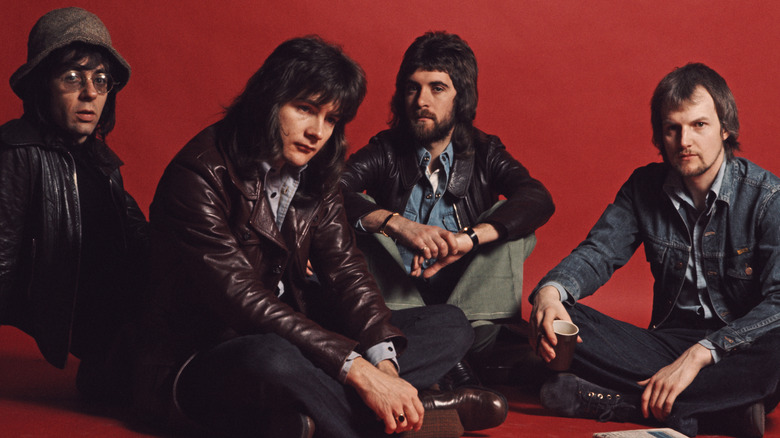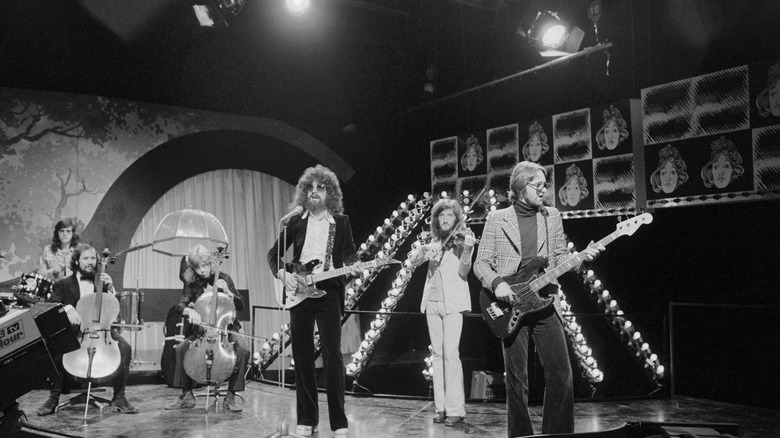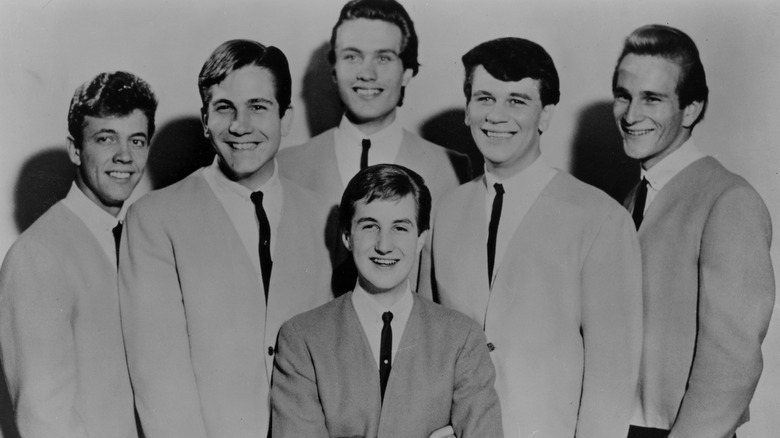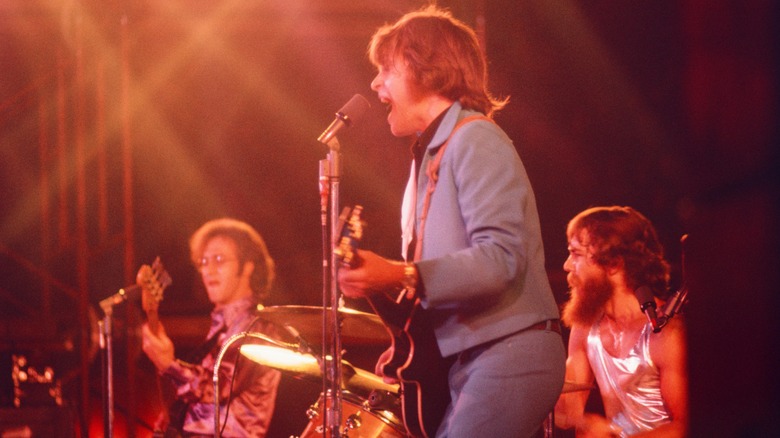Commonly Misunderstood Classic Rock Lyrics You May Be Singing Wrong
The human brain is an incredible organ. When faced with uncertainty and confusion, it will work overtime to make sense of chaos. According to Psychology Today, our brains actually need to see patterns in the streams of data our senses bring us. This comes in handy in situations when we have to make decisions based on incomplete information, since our minds' ability to piece together clues and arrange them into something coherent makes those decisions possible. But sometimes our brains' need for patterns backfires, like when we mishear a song lyric and spend our whole lives singing the wrong words.
We've all done it. As The New Yorker explains, the phenomenon is so common there's actually a word for it: mondegreen, a word coined by writer Sylvia Wright. When Wright was young she misheard a line in an old poem as "They hae slain the Earl Amurray, / And Lady Mondegreen" instead of the correct line, "They hae slain the Earl Amurray, / And laid him on the green."
It all comes back to our brains' love of patterns and hatred of chaos. When we can't quite make out a song lyric, our brain makes something up. Since we're so good at patterns, what we made up makes sense to us and we spend our lives singing the wrong words. Here are some commonly misunderstood classic rock lyrics you may be singing wrong.
Enter Sandman by Metallica: Most misunderstood
Some people find mondegreens so fascinating that there have even been polls conducted to figure out what songs are the most misheard. For example, the folks at WordFinder by YourDictionary surveyed 1,000 people to identify modern rock and pop songs that were commonly misunderstood. The results were a little surprising: In the heavy metal category, the song most frequently misunderstood was the all-time classic "Enter Sandman," off Metallica's self-titled 1991 breakout album.
Weirdly, Loudwire reports that the mondegreen people made from "Enter Sandman" was "Eggs and light / End all nights" from the actual lyric, "Exit light / Enter night." Singer James Hetfield stretches out the word "exit," so you can sort of understand why people hear "eggs and," although it's weird listeners just accepted one of the fiercest heavy metal bands in the world was casually singing about eggs.
Revolve Magazine points out the craziest thing about all this is that 70% of the people surveyed misheard these lyrics, making "Enter Sandman" by far the most misunderstood song of all time, at least in the United States — yet the study also concluded that heavy metal songs were misunderstood least often, making the Metallica debacle a real head-scratcher.
I Want to Hold Your Hand by The Beatles: Not about drugs
When The Beatles stormed America in the early 1960s, the country was still a few years away from the counterculture protests that would come to define the decade. The quartet showed up as four relatively clean-cut guys in suits, although their hair was pretty long by 1960s standards and, as noted by Rolling Stone, The Beatles' music was innovative and even shocking for the time.
Still, it's not too surprising their 1963 song "I Want to Hold Your Hand" was reportedly misunderstood by more than half of the people surveyed by WordFinder by YourDictionary. People had been mishearing these particular lyrics since the song was released. Ultimate Classic Rock reports that the lyrics in question, "I can't hide, I can't hide, I can't hide," were immediately misheard by people as "I get high, I get high, I get high." In 1963, cannabis wasn't at all mainstream, so if you thought the biggest rock band in the world was singing about getting stoned, it was pretty exciting stuff.
As noted by Far Out Magazine, these misheard lyrics caused a few misunderstandings. When The Beatles met fellow legend Bob Dylan, he hauled out a bag of smoke and casually offered them some, assuming they were experienced stoners because of their song. But in fact, The Beatles were pretty inexperienced — though they were fast learners.
Smells Like Teen Spirit by Nirvana: Purposeful gibberish
As joyously noted by The AV Club, Weird Al Yankovic's parody of "Smells Like Teen Spirit" by Nirvana is all about how incomprehensible the song is (at one point, he literally devolves into singing gibberish). Hilariously, the parody's lyrics begin "What is this song all about? Can't figure any lyrics out." So it's not surprising that it's been misheard by 51% of people surveyed by WordFinder by YourDictionary.
Louder reports that the most misheard line is the chorus of the song: "'With the lights out, it's less dangerous / Here we are now, entertain us," which a lot of people hear as "With the lights out, it's Las Vegas / Hear me all now, entertainers." That mondegreen at least has the benefit of making a little bit of sense, even if it's completely wrong. Far Out Magazine reports that some hearing-challenged folks think lead singer Kurt Cobain is singing "Here we are now, in containers," which ... does not have the benefit of making even a little bit of sense.
According to American Songwriter, the level of difficulty people had understanding the lyrics was intentional: Cobain said he used "pieces of poetry and just garbage" when writing the song, despite the fact people often looked for deep meaning in Nirvana's music. His mumbling and slurring vocal style — which adds an extra layer of difficulty to understanding the song — was also done deliberately to add a sense of mystery.
Purple Haze by Jimi Hendrix: Zipf's Law
Far Out Magazine notes that "Purple Haze" by the Jimi Hendrix Experience wasn't just the breakthrough song for the legendary guitarist, but also a wild step forward in rock music and recording technology. Sporting one of the most recognizable opening riffs of all time, the song is also one of the most misheard. The line "Excuse me while I kiss the sky" has been misheard often as "Excuse me while I kiss this guy." So often, in fact, that it's actually the name of a website dedicated to cataloging mondegreens in modern pop music. According to Far Out Magazine, Hendrix's muffled singing style contributed to this misheard lyric. The legendary distortion used in the song may also have had something to do with it.
The New Yorker explains there's a fundamental reason why "Purple Haze" is so commonly misheard. There's a linguistic phenomenon known as Zipf's law that basically says you're likely to hear words you're more familiar with. Since it's not exactly common for people to kiss the sky, but it's pretty common for people to kiss some guy, people unsure of what Hendrix is singing are more likely to assume the latter is correct.
Making things worse (or more hilarious, depending on your perspective) is the fact that Hendrix himself would sometimes impishly kiss a guy on stage when performing this song, reinforcing the misunderstanding, according to The New York Times.
Money for Nothing by Dire Straits: Controversial
"Money for Nothing" was a huge hit for Dire Straits and its lyrics have been controversial since it was released. According to Ultimate Classic Rock, the song was composed specifically to get video airplay on MTV, which at the time was at the height of its cultural power. Mark Knopfler wrote the lyrics to the song while in a store, listening to an employee make sarcastic comments about a video playing on MTV. Many of the lyrics were taken directly from that anonymous worker's commentary — including a homophobic reference that Yahoo! reports was banned on Canadian radio and is almost always changed when the band plays it live.
Sadly, that lyric is understood perfectly — according to Far Out Magazine, it's a different part of the song people have been mishearing since 1985. The line "Money for nothin' and your chicks for free" — a comment on how smart rock stars were because they didn't do real work but got enormous compensation — is frequently misheard as "Money for nothin' and chips for free," possibly because people are snack-ish when hearing the song. In fact, according to WYTV News, a poll conducted by hearing aid company Starkey Hearing Technologies found "Money for Nothing" to be one of the most misheard songs of all time.
Blinded by the Light by Manfred Mann's Earth Band: Unhygienic
Bruce Springsteen is a modern-day poet in many ways, and his song lyrics are often inscrutable, filled with Jersey-specific references and imagery that only makes sense to Springsteen himself. A perfect example of the songwriter's genius is "Blinded by the Light," a song Louder notes appeared on Springsteen's debut album "Greetings from Asbury Park, N.J." but which became best-known due to a cover version recorded by Manfred Mann's Earth Band.
American Songwriter notes that Manfred Mann's Earth Band intentionally changed some of Springsteen's lyrics, changing "Cut loose like a Deuce" to "Revved up like a Deuce." Lifehacker helpfully explains that "deuce" was a slang term for a hot rod (think "Little Deuce Coupe," by the Beach Boys), so the change made a bit of sense. Unfortunately, the changed lyric was almost immediately misheard as "wrapped up like a douche." The song went unplayed in some areas of the U.S. because people thought the band was singing about a feminine hygiene procedure.
Springsteen was reportedly initially unamused by both the change and the misinterpretation, but in 2005 had softened enough to joke about it, saying, "what can I say, the public spoke." Mann said people often theorized the song became such a huge hit because listeners kept requesting it to figure out what he was saying in the lyrics.
Don't Bring Me Down by Electric Light Orchestra: Nonsense for the win
Ultimate Classic Rock reminds us that "Don't Bring Me Down" by Electric Light Orchestra was a big hit for the group, peaking at No. 5 on the charts in 1979. The entire song was made up by bandleader Jeff Lynne in the studio — including the lyrics, which Lynne made up after the instrumental track and even background vocals had been recorded. Which might explain one of the most famous misheard lyrics in rock history: Everyone seems to think Lynne is singing "Bruce!" at the end of the title line.
This is understandable, because what Lynne's actually singing doesn't make a whole lot of sense. Rolling Stone reports that Lynne tossed in a nonsense word, "groose," at the end of that line simply because there was a gap in the vocals. He thought he would think of something better later, but when an engineer told him that "groose" means "greetings" in German (Q105 notes the German word is actually "Gruss," pronounced "groose") he decided to just leave it as is. Lynne eventually gave in to popular demand and simply began singing "Bruce" when he performed the song.
There's a bit of a conspiracy theory here, though, because another engineer who worked on the song swears that the original title was "Don't Bring Me Down, Bruce," and was meant to be a joke about how many men are named Bruce in Australia. Which is just weird.
Louie Louie by The Kingsmen: Least comprehensible lyrics of all time
In terms of sheer incomprehensibility, "Louie, Louie" by The Kingsmen is a good candidate for the top honors, as a song with lyrics almost no one understands. As noted by The New Yorker, the entire song is basically one long mondegreen because of the crude recording setup. According to Far Out Magazine, the song cost $50 to record and sounds like it. Vocalist Jack Ely had to stand a few feet below the microphone and sing while his band played live around him — loudly. The end result was a hit song with lyrics no one could properly hear, and everyone could wildly mishear. This resulted in a wide variety of misheard lyrics amounting to distinct interpretations of the song, all absolutely filthy.
According to History, the incomprehensibility of the track quickly gave rise to a rumor that the song, as recorded by The Kingsmen, had pornographic lyrics (the original version by The Pharaohs has clear and very tame lyrics). Because no one could be quite certain that the slurry gibberish Ely was singing wasn't obscene, the Federal Bureau of Investigations (FBI) got involved, and spent two years determining that the song was not, in fact, obscene.
Interestingly, Lifehacker reports that while the song's lyrics weren't obscene in any way, the drummer does in fact yell an obscenity in the background about 54 seconds into the song. Once you hear it, it's obvious — yet no one ever complained about it.
Summer of '69 by Bryan Adams: Dirtier than you think
There's always been something a little off about Bryan Adams' 1984 hit "Summer of '69." As noted by Britannica, Adams was born in 1959, which would have made him just 10 years old when the teenage adventures described in the song supposedly happened. Even allowing for the fact that many songwriters assume personas to tell stories through their music, Adams wouldn't have been old enough to really appreciate what 1969 in America was like.
As noted by American Songwriter, that's because the song was never meant to be taken literally: It is, just as every 14-year-old kid in 1984 assumed, an extended sex metaphor. Adams says he was inspired by Bob Seger's song "Night Moves," which is also about young love and sex, and Louder also reports this applies to the song's title, which Adams intended as a reference to the sexual position, not the literal year.
Adams' songwriting intentions make the commonly misheard lyric of the song even more hilarious: Many people assumed the first line of the song was "I had my first real sex dream" instead of the more innocent-sounding "I got my first real six-string." The fact that the misheard lyric makes absolutely zero sense in the context of the other lyrics didn't stop people from singing it wrong, of course.
Blowin' in the Wind by Bob Dylan: No ants involved
According to NPR, Bob Dylan always claimed he wrote "Blowin' in the Wind," one of his most famous compositions, in about 10 minutes. The song went on to become one of the most iconic tunes of the 1960s — and as noted by The Harvard Crimson, Dylan's vocal style was revolutionary. His imperfect growl was a shock when the song came out in 1963 and would change the perception of what was allowed in a popular recording. His "nasal tone and imprecise pitch" wouldn't cut it on a show like "American Idol" or "The Voice," but he injects these imperfections into his singing purposefully.
But that imperfect voice also made sussing out the lyrics more difficult. As noted by The New York Times, the lyric "The answer, my friends" is often misheard as "The ants are my friends," and Dylan's lo-fi approach to vocals is one reason so many people mishear the line. This is another example of a mondegreen or misheard lyric that doesn't make a whole lot of sense if you pause to think about it.
What's truly remarkable about this misheard lyric is the fact that "Blowin' in the Wind" is, according to The Washington Post, the most-covered Bob Dylan song of all time. With more than 300 versions released over the years, you'd think people would be more certain of the lyrics.
Paranoid by Black Sabbath: A sad mishearing
According to author Paul Wilkinson in his book "Rat Salad," Black Sabbath wasn't entirely sure of what the word "paranoid" meant when they wrote their hit song of the same name — it was just a "vogue word" people were using. So perhaps it isn't entirely surprising that one of the most famous misheard lyrics in rock history occurs in the song, since the songwriters had a pretty shaky grasp of the English language to begin with.
According to lead singer Ozzy Osbourne, in his book "I Am Ozzy," people misheard the closing lines of the song, "I tell you to enjoy life," as "I tell you to end your life." He has attempted to correct reporters when asked about the lyrics, but the rumor persists.
According to Ultimate Classic Rock, this misheard lyric crossed over from mildly amusing to tragic when a music fan named John Daniel McCollum died by suicide while listening to another Osbourne song. McCollum's parents sued, claiming Osbourne's lyrics encouraged his fans to end their lives. "Paranoid" and its misheard lyric became a key point during the trial. Ironically, the real lyric is a positive, life-affirming sentiment.
If you or anyone you know is having suicidal thoughts, please call the National Suicide Prevention Lifeline by dialing 988 or by calling 1-800-273-TALK (8255).
Bad Moon Rising by Creedence Clearwater Revival: Sweet relief
As noted by Psychology Today, remembering song lyrics is a "reconstructive" activity, and in most songs, your efforts to remember the lyrics are constrained by the structure of the song and the meaning of the lyrics. Understanding what a song is about forces you to choose words that make sense in context. In other words, the more tightly written a song is, the harder it is to get the words wrong.
Sometimes, of course, misheard lyrics occur because they're amusing. Such is the case with the song "Bad Moon Rising" by Creedence Clearwater Revival, which has a pretty famous misheard lyric in "There's a bathroom on the right," instead of "There's a bad moon on the rise." As noted by Louder, songwriter John Fogerty intended the song to convey a sense of doom, and filled the lyrics with scary stuff — earthquakes, lightning, "rage and ruin." No one could possibly think there's a reference to a bathroom in the song — which is precisely what makes the misheard lyric so funny.
Fogerty gets the joke. He admits that he can understand why people might mishear that particular line — and he purposefully sings the bathroom version in concert just "for fun."
